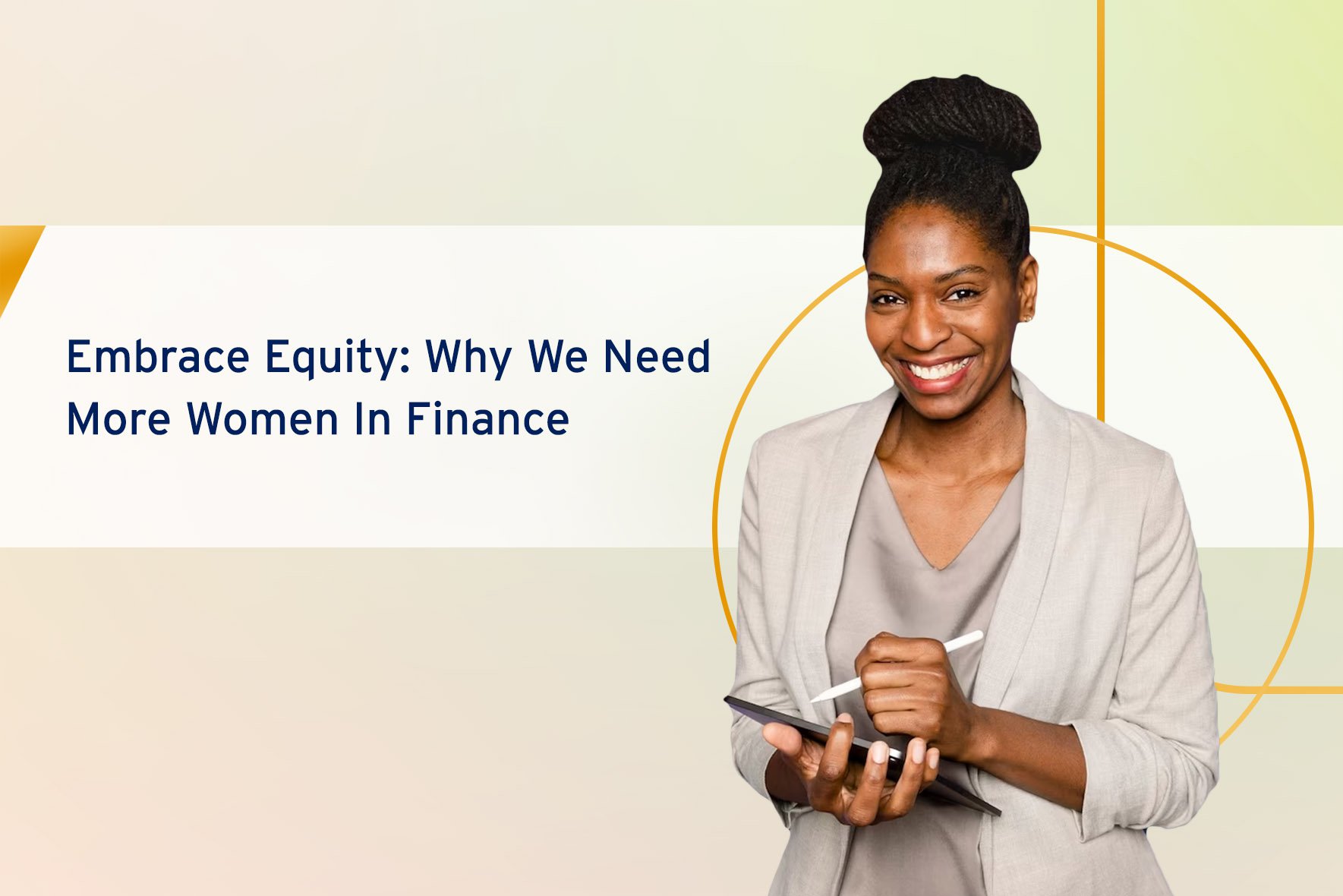
Embrace Equity: Why We Need More Women in Finance
Author Taiwo Temitope-Adesope
This International Women’s Day (IWD), let’s go beyond celebrating women’s achievements—we must also embrace equity. Women continue to break barriers in finance, yet there’s still work to do in fostering greater representation. In this blog post, we’ll explore why female participation in finance matters, the challenges they face, and how we can create a more inclusive industry.
We will also look at some inspiring stories from successful female professionals who have broken through barriers to reach their goals. By embracing equity, we can create a better future for everyone.
Equity vs. Equality: Understanding the Difference
Equity ensures fairness by acknowledging different starting points and addressing imbalances. It involves providing people with the resources they need to succeed, rather than simply offering everyone the same opportunities (equality). In finance, embracing equity means creating an industry where women can thrive by removing systemic barriers that limit their participation.
Why Are There Fewer Women in Finance?
Despite progress, women remain underrepresented in finance. The World Economic Forum’s Global Gender Gap Report identifies finance as one of the most male-dominated sectors. A study by The Forté Foundation highlights that even as gender equality improves in business schools, the number of women pursuing finance careers remains stagnant. Some key challenges include:
1. Lack of Mentors and Role Models
Many women in finance cite the absence of mentors as a major hurdle. Female mentors play a crucial role in guiding young professionals, boosting confidence, and navigating corporate structures.
2. Work-Life Balance Concerns
The demanding nature of finance roles can make work-life balance difficult, particularly for women who juggle professional and family responsibilities.
3. Competitive Industry Perceptions
Finance is highly competitive, and women may underestimate their capabilities, leading to fewer applications for leadership positions.
Why We Need More Women in Finance
Beyond fairness, increasing female representation in finance benefits businesses and economies. Studies from the International Monetary Fund (IMF) show that greater inclusion of women as users, providers, and regulators of financial services leads to economic growth and financial stability. Here’s why:
1. Diverse Problem-Solving Abilities
A diverse workforce introduces fresh perspectives and innovative solutions. Women bring different approaches to risk assessment, investment strategies, and client relationships, enhancing decision-making processes.
2. Increased Collaboration
Women are more likely to foster teamwork and build coalitions, driving organizational success. Leaders like Ibukun Awosika have demonstrated the value of collaboration in corporate leadership.
3. Higher Employee Engagement
Women tend to emphasize open communication, creating stronger, more cohesive teams. Studies show that female-led teams often report higher engagement and productivity.
4. Improved Financial Performance
Companies with gender-diverse teams see higher profitability. Research consistently links female leadership to better financial outcomes, making diversity a strategic advantage.
5. Stronger Risk Management
IMF research suggests that women excel at risk management. They consider long-term implications, leading to more stable financial institutions and better economic resilience.
Celebrating Nigeria’s Leading Women in Finance
Nigeria has produced trailblazing women who have made significant contributions to finance. Some notable figures include:
-
Ngozi Okonjo-Iweala – Director General, World Trade Organization (WTO) and former Nigerian Minister of Finance.
-
Ibukun Awosika – Founder, The Chair Centre Group, and former Chairperson, First Bank of Nigeria.
-
Khadijat Abdulkadir – CEO, Xerde Limited, creators of the social financing app, Tudo.
-
Yemisi Edun – CEO, First City Monument Bank (FCMB), the first woman to hold this position.
-
Miriam Olusanya – CEO, Guaranty Trust Bank (GTB), the first female to lead the institution.
-
Nneka Onyeali-Ikpe – CEO, Fidelity Bank Nigeria, breaking gender barriers in banking.
-
Odunayo Eweniyi – Co-founder & COO, PiggyVest, a leading digital savings platform.
-
Fara Ashiru Jituboh – CEO/CTO, Okra, pioneering open banking solutions in Nigeria.
-
Eloho Omame – Co-founder, FirstCheck Africa, supporting female-led startups.
Creating an Equitable Future for Women in Finance
To build a more inclusive financial sector, organizations must: ✅ Provide access to mentorship and networking opportunities.
✅ Implement policies that promote work-life balance.
✅ Foster a culture of inclusivity and equal opportunity.
✅ Actively recruit and support female talent.
By embracing equity, we can create a finance industry where women not only participate but thrive. This IWD, let’s commit to dismantling barriers and championing female leadership in finance. The future is equitable—let’s build it together.
Take Control of Your Finances with nairaCompare
Are you ready to take charge of your financial future? Whether you're saving for your next big goal or looking for investment opportunities, nairaCompare helps you find the best financial products tailored to your needs. Compare savings, loans, and investment options from top financial institutions and start making smarter money moves today!
Explore financial products on nairaCompare
About Author

Taiwo Temitope-Adesope
Taiwo is a passionate storyteller and strategist dedicated to empowering women and crafting compelling narratives. A First-Class graduate in Mass Communication from Covenant University, she specializes in writing, public relations, and digital marketing. As a Content Manager at Suretree, she drove a 50% increase in web traffic through SEO and boosted website engagement by 60% in just four months. Her leadership experience includes serving as Public Relations Officer for the Covenant University Student Council and contributing to impactful volunteer initiatives. With expertise in strategic thinking and business acumen, Taiwo continues to create stories that inspire confidence and imagination.
.png?width=1615&height=444&name=nairaCompare%20Christmas%20logo%20(PNG).png)








